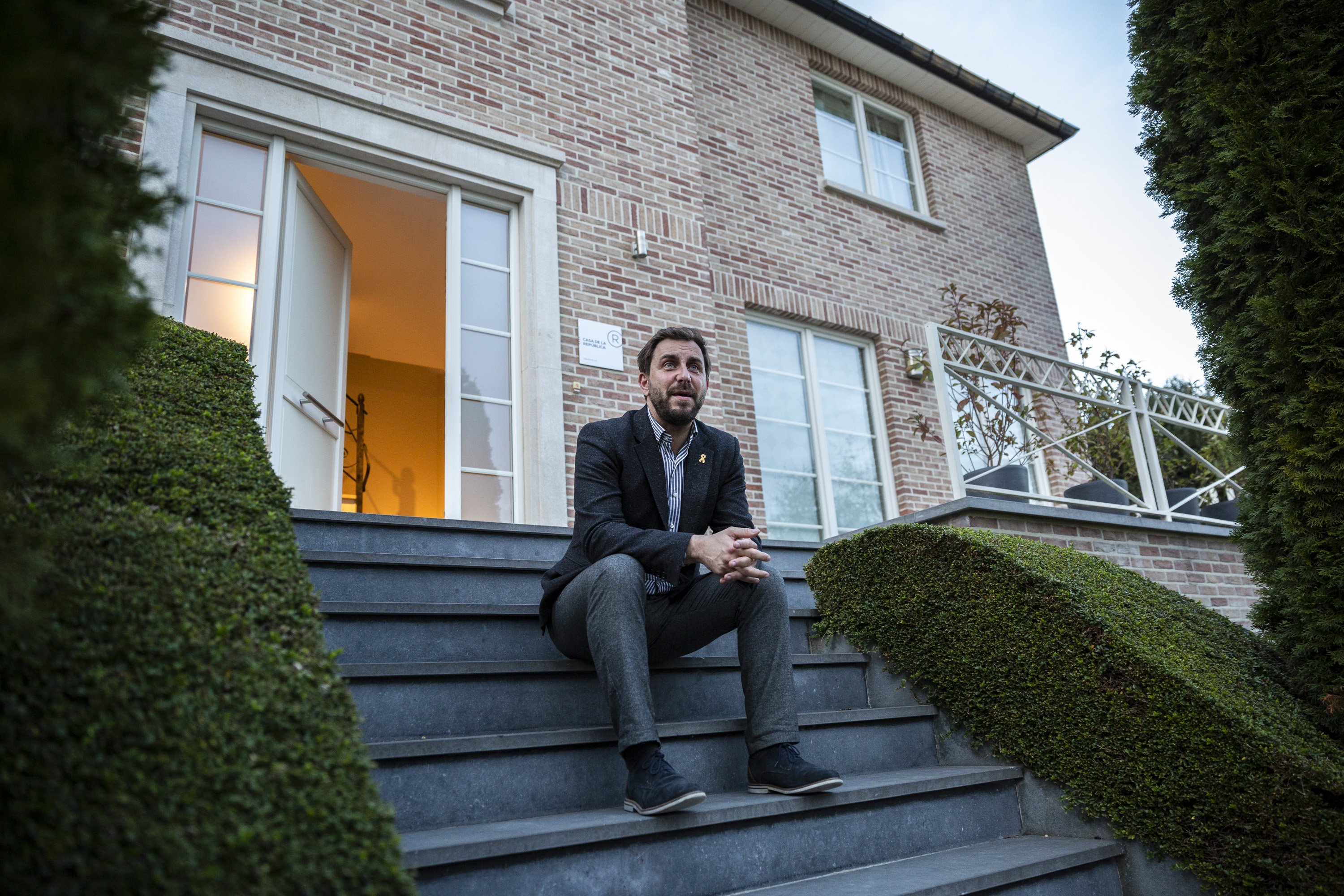The last weekend of October last year, Catalan minister Toni Comín (Barcelona, 1971) put all his winter clothes into a suitcase, got into a car with his family and headed to a town a few kilometres from Perpignan, just over the border into France. He was starting off into exile and did so convinced that the whole Catalan government would do the same. Accompanying him in other vehicles were his sister, Betona, and his friend and Barcelona councilor Jaume Asens, the same person who advised him to pick Gonzalo Boye as his lawyer. Twelve months later, Comín explains that he's had to take "exceptional and extreme" decisions over this year, says that he'll never forget the moment he learnt that his government colleagues had been imprisoned ("our world fell apart") and admits that what he wasn't prepared for was the internal struggles within the independence movement.
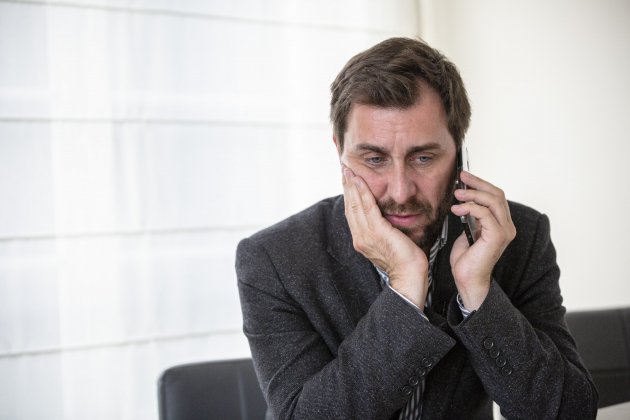
How are you after a year in exile?
I don't let myself think about that question because the answer is too long.
Why?
It's very long because there are two parts: the political and the personal. And in both cases in some senses you're fine and in other senses it's complicated.
So...
On the personal side, I promised myself that when my daughter came here her house, city, school, would change, but her father wouldn't. She had a happy and cheerful and lively dad, and has the right to keep the same dad she had in Barcelona. That forces you to stay strong. I don't want my daughter to have a depressed or bitter or angry father, she doesn't deserve that, it would make her a totally unacceptable victim of the repression. There are already enough victims of the repression. So I'm fine. But on the other hand we won't be fine until we return home. Moreover, you suffer for the people you know need you and who you can't give the support you want to right now. My mother is very elderly, she's just lost a son, my brother. As such, on the personal side, there's a lot of bright spots and much sadness too.
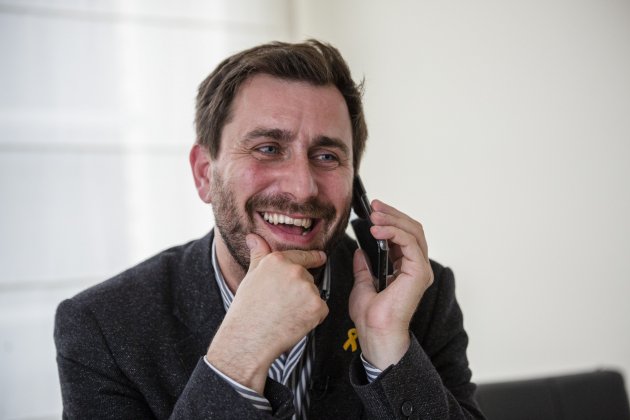
We're very strong. Exile makes sense as long as you're in a combative mode, democratic, peaceful but combative for a cause which you consider is worth the sacrifice
And the political side?
We're very strong. We have been since the beginning. Exile makes sense as long as you're in a combative mode, democratic, peaceful but combative for a cause which you consider is worth the sacrifice we're all making together. That's what we're doing in exile, fighting for democracy, for the recognition of Catalonia's right to self-determination. For that reason we're very well politically, ready to fight against a state which has drifted towards authoritarianism, which has revived its worst skeletons and has brought back the Francoism it had got hidden behind the closet. We've been very strong this whole time, maybe even stronger than we would have imagined. What's more, we've been chalking up many legal victories, one after the other. However, at the same time I'm worried, in terms of politics, worried because there was something I wasn't ready for.
I wasn't prepared to see these internal conflicts. I do admit that this lack of union is very troubling
What's that?
To see these internal conflicts, these debates. On the other hand, if there's anyone who can understand them, it's me, because knowing all the participants you understand very well all their reasons. As such, it's not that I'm blaming anyone for these internal tensions within the independence movement, it's not a question of doling out responsibility and blame, but I do admit that, politically, this lack of union is very troubling and worrying, this image of a lack of union given at times over this last year. Too often, at key moments, we've shown little unity. And that, in part it demoralises people; that the victims should quarrel, argue between themselves, that becomes unbearable for people. When I say "people", I'm referring to the two million plus who are in favour of the Catalan republic, and as such that's a source of concern. In the political sphere there's also light and dark.
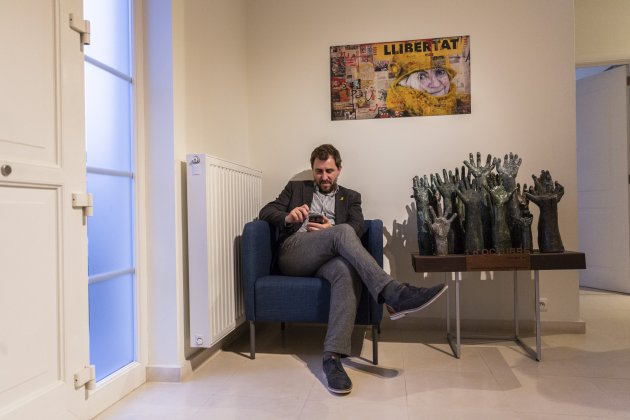
Why are there these problems attaining unity?
Maybe we weren't aware enough, all of us, that on 27th October the rules of Catalan politics changed. We'd made a declaration of independence which meant a head-on collision with the Spanish state and that clash caused victims at levels of sacrifice never seen before. Until that moment, the fight for hegemony within the independence movement held an important place in the parties' strategy. But there's a moment when the war starts, if you'll excuse the military metaphor. Then the rules of the game changed. If you want to win the conflict with a Spanish state which is already starting with all its violence, you need much greater unity, you need to put aside the internal conflict. You have to suspend the fight for hegemony, and the people see that intuitively and don't tolerate the parties continuing both fights. I've repeated this comparison to death: France and England competed over the continent of Europe, but the day that they declared war on Hitler, they became allies. We made a declaration of independence, which for Spain is a declaration of war (and that's how it reacts), so the independence movement should act in absolute unity. It's very simple to understand.
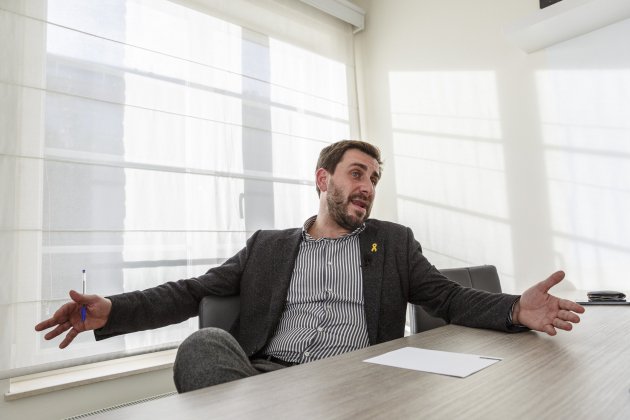
What is the Consell per la República (Council for the Republic)?
Let me start by saying what it isn't. It's not the government of a virtual republic without any territory. It's not that. Nor is it an NGO or a civil society body.
And what is it?
The Council is an institution which has a mission to defend the legitimacy of the mandate of the 1st October, a public mandate, given by citizens in a referendum organised by a government. In the service of this objective, we need strategies. Internationalisation, which will be the most obvious of the tasks the Council will carry out, isn't the Council's purpose, it's one of the main tools it has available for its work, but its mission is the recognition of Catalonia's right to self-determination. The objective is that when we exercise self-determination it should be respected.
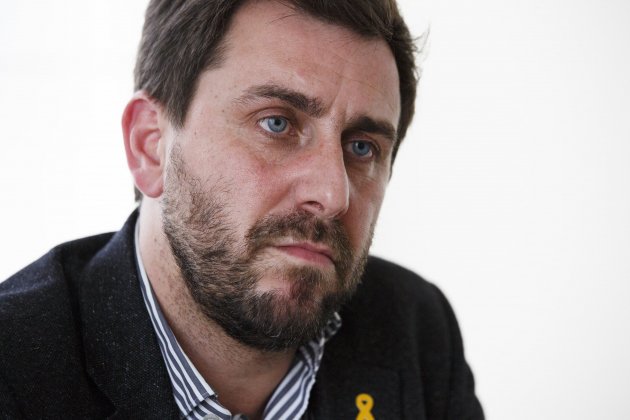
How is it funded?
In the investiture agreement [for the current Catalan government] there's a line that says that the Council will be funded privately.
Will it be registered in Brussels or Barcelona?
Wherever is best for us, because it's a tool. Wherever's easiest for us, wherever we would have the greatest legal security, wherever would cause the fewest problems, wherever the Spanish state's persecution would be least effective.
How is the Council linked to the Catalan government and Parliament?
Those are things that we'll explain in more detail when it's time...
The objective is that when we exercise self-determination it should be respected
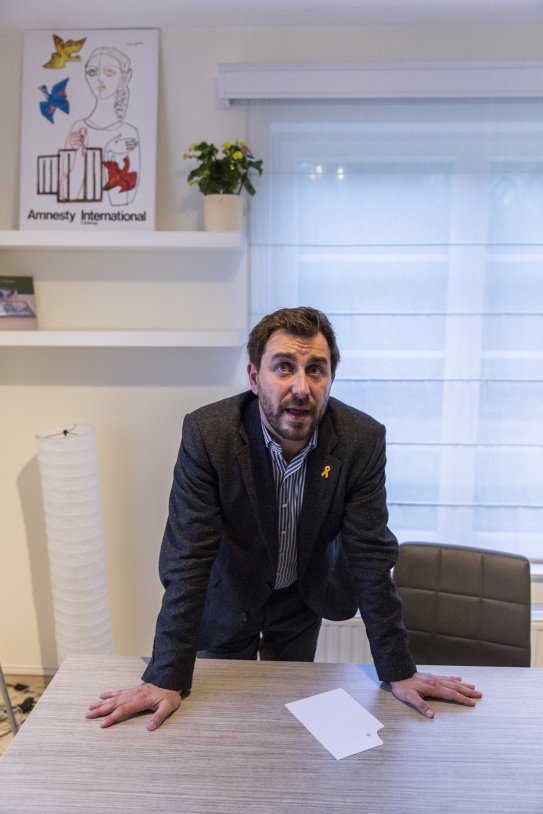
Does the independence movement have to negotiate the budget with the Spanish government?
The prisoners aren't bargaining chips. What's happening with my government colleagues is ignominious, unbefitting of a democratic state and, as such, the first thing the state has to do is to behave democratically. Then it can ask us for many things, but not before. Spain isn't under the rule of law, the speaker of the Flemish Parliament says so, many people think so, and what we have to say when talking about the prisoners is that we want them to be released, for the case to be annulled. That's the main objective of our dialogue with the Spanish government. We know that the trial is inevitable and, as such, what we're doing is to ask for acquittal, the case should have been shelved from the start. The state's legal service does answer to the government, as such, tomorrow, the legal service can withdraw the accusations of misuse of public funds, which the other accusations hang on. If it withdraws the charge of misuse of public funds, the charge which gives it the right to appear in the case, it would have to withdraw them all.
What's been the worst moment of this year in exile?
The worst moment of this year is the worst independent of exile: my brother's death. It would have been the worst moment even if I hadn't been in exile.
Do you see yourself in Catalonia?
Yes.
Soon?
What does "soon" mean?
Within a reasonable period of time...
What does "reasonable" mean?
I see myself in Catalonia later than I'd wish but, maybe, before we think
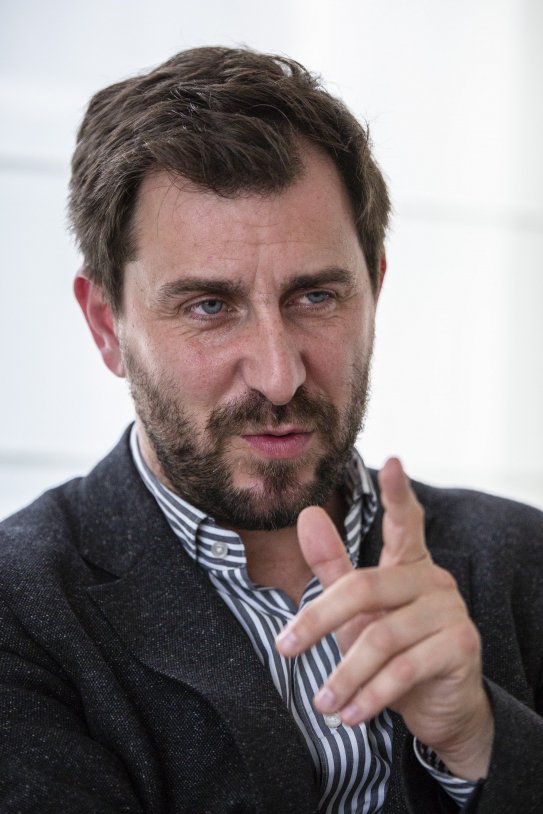
That your daughter can go back to her school...
Between one and twenty years? I always say, they give us a range of between one and twenty years... I see myself in Catalonia later than I'd wish but, maybe, before we think. Later than I'd wish because it will always be late for me. Nostalgia makes the hours stretch out a lot and the epic makes them shorten greatly. We are living trapped between the epic and nostalgia. And, as such, the hours stretch and shorten at the same time, even though that goes against the laws of physics.
And the overall perspective...
Many things have happened. On a personal level, many very important things have happened to me. And on a political level it's the same. I don't believe there's been any other year in my life in which I've had to take such extreme, such exceptional, such unusual and extraordinary decisions, either politically or personally. We've been taking decisions which aren't normal in a person's life. But I do say that maybe we'll return sooner than we think. We have to see what will happen [in the European courts] in Strasbourg, how this seduction of international public opinion through the Council for the Republic develops, we have to see what results from the mobilisations, what ability we have for a peaceful rupture starting from civil society, when we have the energy again, the spark to bring the country to a standstill again...
There was a natural and inevitable consequence of the unilateral declaration of independence, which was called exile
And how's the famous debate on the unilateral path?
The unilateral path depends on the coming together of forces. On that, I don't know if we got it right enough in explaining that first week in exile, the first fortnight in exile... There was confusion, an emotional shock in Catalonia, I don't know if it was well-enough explained that there was a natural and inevitable consequence of the unilateral declaration of independence, which was called exile.
Why?
Firstly, we have to put ourselves in the moment when we were having doubts as to whether we had to make a unilateral declaration of independence or not: logical, reasonable and inevitable doubts, certainly, it would have seemed to me to be irresponsible as a government to not discuss and analyse this scenario and propose other, different scenarios [like] an election. It would have seemed stupid and irresponsible to me to not have discussed this scenario. Because we knew who we were facing, we weren't embarking on the unilateral declaration of independence naively, starry-eyed, without knowing what repression would come down upon us. No. They'd already locked the 'Jordis' in prison, on 1st October they'd already beat us, as such, we already knew that the Spanish state had decided to violate all the limits and cross all the lines in terms of reputation and shame, and was prepared to do whatever was necessary. They'd already explained to us what [article] 155 would be like, they'd threatened to lock us all up in prison. We already knew all of that, as such we knew the force the Spanish state was prepared to use.
Not avoiding the repression and the victims of that repression for a battle which you accept as a lost cause doesn't make sense
And what should the response have been?
Here's where we had to have a debate, to say that, given such a degree of threat, our adversary's strength, are we going to battle or not? And if we're going, let's go for it, not so that it can't be said that we didn't do it. You don't do it to look good. We're going to this battle to win it. We're aware how difficult it is and we're not 100% sure if we should start it. Now, if we start it, if in the end we say that the mandate from the 1st October referendum is sacred and we make the declaration of independence, it's not to say that we've met our promise to the people and now I'm surrendering at the first opportunity. No. If you have to surrender at the first scuffle, then don't go to war, better call an election and you'll save yourselves part of the repression. Going to battle, taking for granted that you'll lose it, but so that it's not said that you didn't and that you abandoned all those sacrifices, the injured, lying along the way... It doesn't make sense. Not avoiding the repression and the victims of that repression for a battle which you accept as a lost cause doesn't make sense. That's the key. To accept there'll be victims of the repression, that you could have avoided them, as a result of a battle which you give up for lost makes no sense, politically speaking. If we go for the unilateral declaration of independence, it's to start the battle against the state, in which the joining of our forces is whatever it is.
To lead this battle the only option is exile. With everyone in prison, it would be very difficult
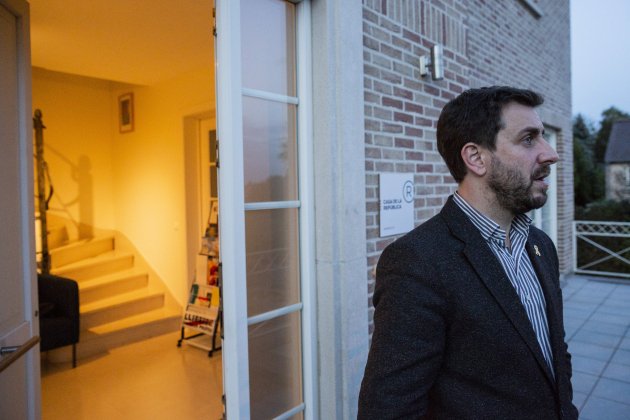
Why do you say that exile is the natural step?
Because to lead this battle, given the joining of forces, the only option is exile. Without exile, this battle is very difficult to lead. With everyone in prison, it would be very difficult. The joining of forces was what it was, I mean, if we stayed (as has been shown), they would have locked us up or silenced us. Our position in Catalonia is somewhat fragile given the state's repression, the state has a great capacity for doing harm to leaders, to the organisation, to the independence movement... As such, it doesn't make sense to make a unilateral declaration of independence to surrender within five minutes... The day after the declaration this battle starts. This battle, like any other, needs to be led. Exile was essential to be able to lead this battle.
Our exile has a power in the telling which, without prison, it wouldn't have
Is prison important too?
Very. Very, very [important]. Our exile has a power in the telling which, without prison, it wouldn't have. That's clear. One sacrifice and the other are dramatically complementary, prison and exile.
When did you decide to go into exile?
The weekend of 28th/29th October we talked about exile as an option for everyone. As an option for the government, shared, a joint decision. But it was decided that it remained a personal decision for everyone. Because exile was politically coherent, but staying was also politically legitimate. From then on, we said it was a personal decision. And we weighed up our personal situations.
You didn't all say what you'd do...
We explained what we'd do over Monday and Tuesday.
Until that Sunday, the belief was that we were all going into exile
Did you talk about possibilities for the different scenarios?
I think that, until that Sunday, the belief, at least what I thought and many other colleagues, was that we were all leaving. Until Sunday, the idea that was more or less accepted is that we were all going into exile together. Then, Monday, from Monday to Tuesday, there were absolutely legitimate personal decisions [made] which, I insist, have been politically fruitful. Even if it's atrocious to have to say it like that. When you explain to the world that half the government is in exile, people are scandalised, and a very important part of the solidarity with the Catalan cause is down to the fact there are political prisoners, clearly.
What caused this change?
I can't speak for the others. There, at that time, many things were going through everyone's heads, many political and personal considerations were mixed up... As such...
The departure was organised...
It was organised. There were also unexpected factors which had their impact. At a certain moment it seemed that nobody would be summonsed to testify until Monday 6th November, and, as such, it seemed that there were a few days to go from Barcelona without any risk, because the lawsuit had been presented but there were no arrest warrants, nor had we been summonsed to testify. Tuesday night, however, the summonses to go to testify on Thursday start appearing. That was unheard of, that the day before All Saints', which is a public holiday, they should summons people to testify for a case where the lawsuit had been presented on the Monday and the lawyers hadn't had time to study it... The series of irregularities is so shocking that it meant our calculations were wrong.
Knowing that they were all locked up, our world fell apart
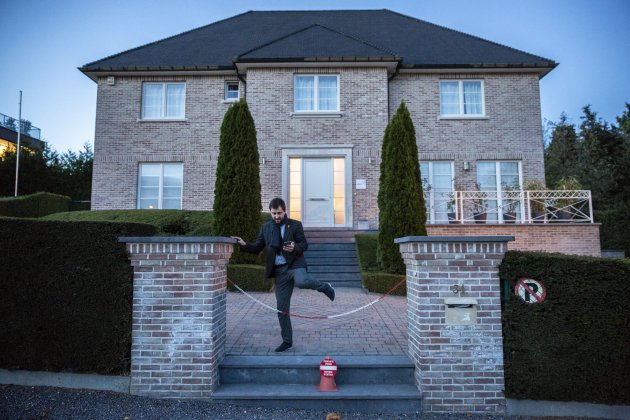
Were the first days the most complicated?
I remember it was a traumatic moment when they told us that they'd been kept in prison. We could foresee it, we saw it coming, but still, until it's confirmed, you keep that hope. Knowing that they were all locked up, our world fell apart. An especially painful moment from the first days... It was the confirmation of what we already knew, that the Spanish state had made its decision, the confirmation that Francoism is still alive, that 30 years of democracy had meant much less than we thought, and that is a catastrophe. Now we know that the Transition [to democracy after the end of the dictatorship] wasn't that. Because in the end, if Francoism took refuge in the judiciary, in the large media outlets, Francoism took refuge in the large Ibex companies, the police, and we've all tried to show that Spain was a modern, European democracy and yet at the first important crisis, it turns out that that Francoism that was lying there, camouflaged, reappears, it takes its mask off and again takes control of key state resources, well then we have a drama. It means Francoism didn't die and the transition wasn't a transition and that you can't evolve naturally from a dictatorship to a democracy. At some point, you have to "de-Franco-ise" the state, like they did in Germany and Italy. The price is very clear, [namely] that Francoism is still alive in the Spanish state.

